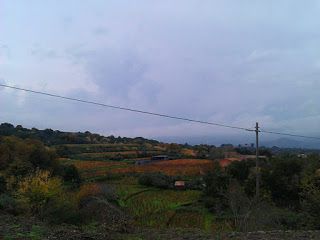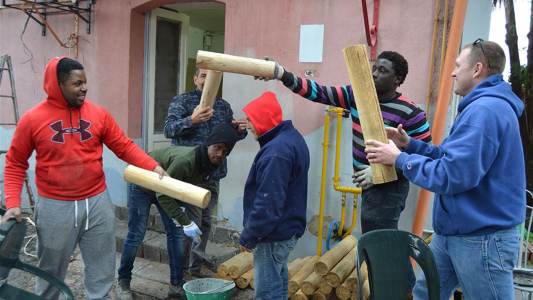Visit at the former Ipab* “Conservatori Riuniti Scandurra” of Messina
The thousands of migrants who arrived in Sicily during the last weeks have reached also Messina. They have been relocated after landing at Port Empedocle, and many arrived at the tent structure of Pala Nebiolo from where the minors, on the 19th of February, were accommodated at the first reception centre created in the facilities of the former Ipab of Scandurra.
The complete renovation of this centre began over a year ago, when the Mare Nostrum operations started to bring to town thousands of refugees who were forced to stay at the tent structure of Pala Nebiolo or at the barrack of Gasparri. Therefore, the social co-operative Senis Hospis, which is currently managing the centre together with the co-operative St. Francesco the of the consortium SOL.CO, decides to invest into the restoration of the former Ipab in order to transform it into a very first reception centre for adults. The months pass by and the situation in Messina worsens, with hundreds of migrants accommodated at Pala Nebiolo in a situation of unjustifiable promiscuity between minors and adults. It is in this context that the prefecture decides through an emergency order and not through the usual tenders to transfer the minors to the former Ipab, which on November 25th in 2014 begins its activity as a first reception centre for foreign unaccompanied minors. (GazzettadelSud)
“To host minors meant to carry out further and significant changes to the facility” said Bonaffini, the representative of the centre, “and the obvious adjustment to the criteria set by the presidential decree of the Sicilian region of the 13th of August 2014 regarding the standards of reception of foreign unaccompanied minors in Sicily”. However, also in this context the omnipresent issue of the emergency has posed serious problems.
I have been to the former Ipab after receiving the authorization by the prefecture and having agreed with the managing organization about the visit. At the moment of my visit the centre hosts 136 minors, all male, for a total capacity of 224 places. The regional decree puts a limit of 60 minors per reception centre, and an even stricter limit (50 minors) has been set at the national level for the start of new projects aimed at accommodating foreign unaccompanied minors. The structure itself is definitely big and spacious , and the recent renovation has renewed the interiors and furniture of the building. Apart from Bonaffini, the whole team has been there to welcome me. First, we visited the office of the representative where they showed me the daily operational proceedings. Starting to talk about the daily communications with the prefecture concerning the number and health of the guests, we further discussed the main nationalities of the minors, mainly Gambia and Mali, but also Ivory Coast, Senegal, Nigeria and Egypt.
Bonaffini explained me that the necessity to deal with the accommodation of a number of minors which is definitely higher than what has been set by the decree – which sets a maximum of 60 persons per centre – led to double or increase also the number of planned professional operators in order to maintain unchanged the ratio between practitioners and costumers. All minors are given the STP** code for getting access to medical care, a code that should be assigned to foreigners who are not regularly present. After the asylum request, unaccompanied minors should be listed into the National Health Service. In addition to a doctor who is contactable 24 hours a day, an agreement for the former Ipab has been made between the prefecture and a pediatrician, Dr Pollicino, who visits the centre on an agreed day of the week and often returns voluntarily also on Saturday mornings.
The legal assistance is assigned to legal operators supported by mediators, who give first general information within 24 hours from the arrival and then individually follow the minors at the centre. Here a more detailed explanation concerning their situation, their rights, duties and consequences of possible choices occurs, as well as an initial preparation for a hearing at the Commission. I directly discuss with one of the legal operators the long-lasting issue of tutors: within 15 days the minors are able to be assigned a tutor, and generally all those who stayed the centre until today were able to fill out the C3 questionnaire (an asylum application form) and therefore complete the identification within two/three months after their arrival. At the moment, there are six tutors, all of them lawyers; a number that is too low and which in some cases means a ratio of one to fifty. According to representatives and operators, this is not to the detriment of the engagement and presence of tutors, who are generally precise and available, but nonetheless the numbers remain significantly high. Still, the great common effort is to obtain the transfer of these young people to more suitable communities and structures within the prescribed timeline, i.e. three months, but this happens only rarely. Apart from being English, French and Arabic, the mediators are of different nationalities and know several languages and African dialects, including Tigrinya, Wolof and Bambara. Their work is fundamental and greatly appreciated, especially by newcomers – it functions as a support for every activity and is indispensable for clarity and for future integration. Bonaffini also explains that generally every two days every minor receives an agreed daily pocket money of 2,50 euro, but because of a mutual agreement aimed at protecting the minors by avoiding the circulation of high amounts of money, they receive it as phone-cards.
After this long talk we visit the building, which has two floors and a basement where the canteen is situated – run by “La Cascina Global Service” – the laundry room, the rooms for medical care and individual interviews, various spaces for socializing and other toilets. The facility has a total of 59 showers and also many other services. The rooms are spacious, each with four bunk beds and a table with chairs in the middle; today they host about four minors each, but this depends obviously on the influx of migrants to the centre. Walking around the rooms and corridors, we meet youngsters who are organizing their day with the operators or who are attending literacy courses, and do not even seem to notice our presence. Most migrants are sent as soon as possible to the Ctp*** of the town, where their literacy level is evaluated and where, for some, begins the placement into middle school. The starting of these procedures occurs in short periods of time, always in the interest of the minor and sometimes even before the appointment of a tutor, who usually confirms the choices once he has been appointed the fostering.
Later, an operator shows me the different activities of the workshops: physical activity is planned for the morning in the foreseen areas inside or in the courtyard of the centre; further, there are tailoring and arts workshops as well as after-school classes, which also function as support for Italian language classes made outside the centre.
It constitutes a management that underlines the effort to act the best possible way, but is continuously and dangerously undermined by the continual emergency status which, though, cannot justify certain choices made by whom is responsible or their incapacity to find alternative solutions. Because of an emergency order hundreds of minors are hosted for months in structures that should have a maximum capacity of 60 persons, and the territory does not seem to be moving towards different choices. “In my experience”, said Bonaffini, “an emergency order cannot last forever and therefore some decisions will surely be made soon”. This is what we wish for as well, hoping that every change aims at strengthening the protection and at making worthier the reception of those who risked their lives for arriving in Italy.
Lucia Borghi
Borderline Sicilia Onlus
Translation: Chiara Guccione
* Ipab – Istituto pubblico di assistenza e beneficenza: Public Institute for Assistance and Charity
** STP – Straniero Temporaneamente Presente: Temporarily Present Foreigner; it constitutes a health card for irregular foreigners, respectively for those who have not applied for asylum yet and thus, do not possess any documents.
***Ctp – Centri territoriali permanenti: educational institutions




